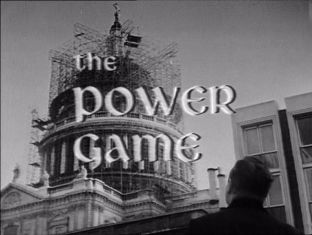
Monday 15 January 1968
Playhouse: The Curtis Affair. Writer Wilfred Greatorex. Director David Reid
Hackett: “He’s got to be chopped down in the public interest.” Withers, “Are you sure it’s only is the public interest?”
The missing link between series two and three of The Power Game . In the penultimate episode of series two, Where Do I Want To Go? , Bligh Construction is shown to have made a massive profit on the M23 motorway project. A profit so large that the Public Accounts Committee will ask if Bligh’s had overstated the tender. As Wilder launches an internal audit he tells Ken that, “the image that we present is that we failed. We may have made a million pounds profit, but in this instance as far as public morality is concerned, we failed.” In the end, the issue of the Public Accounts Committee was left hanging. In this play, Wilfred Greatorex shows how it might have played out.
Electronics tycoon Ramsden Curtis (Andrew Keir) is called to the Houses of Parliament for a select committee investigating alleged excessive profit made by one of his firms on a Government contract. Chairman Austin Withers MP (Geoffrey Bayldon) is a Tory MP, who has made the prescribed journey from Public School to the Army to Parliament. Labour MP Gerry Hackett (Michael Jayston) is a “political whizz kid” who can be “indignant with conviction…assured, able and unscrupulous (covering) intense personal ambition with the glove of social justice.” Fellow Labour MP Audrey Moate (Rowena Cooper) is “attractive ,ambitious but unsure of the ways of Westminster. Mrs Cliveden MP, (Annette Kerr) a fellow Tory, loathes Mrs Moate.
Andrew Keir at 42 was substantially younger than the scripted Curtis, who was described as, “a self-made tycoon of 54.” In a prolific career he had recently starred as Professor Quatermass in the Hammer Films adaptation of Quatermass and the Pit .
Michael Jayston was 33 at the time (younger than Hackett, who was scripted as 40 years of age).A member of the Royal Shakespeare Company, Jayston had appeared on TV before, but this was his most substantial role to date. He would go on to star as Lincoln Dowling in the third series of The Power Game produced by David Reid.
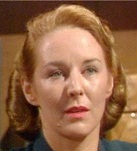
Rowena Cooper as Audrey Moate MP
Ironically, both female members of the parliamentary committee were played by actresses who had a connection with Patrick Wymark. Rowena Cooper (who would go on to play transexual accountant Norman Borman in The New Statesman (1987) had played Eliza Tharm, housemaid/mistress to the Rugely poisoner William Palmer (Patrick Wymark) in the BBC’s They Hanged My Saintly Billy. Annette Kerr (who Kenneth Williams called "My Dearest Mentor) had played the nurse of Patrick Wymark’s Jason Webb in the final scene of Doppelganger( She would also played a nurse in Identified, the first episode of UFO).
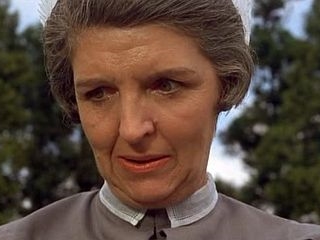
Annette Kerr in the final sequence of Doppelganger
Set in Committee Room 13 of the Houses of Parliament , with windows overlooking the river the play opens as Withers greets Hackett on his return from a lecture tour in America. Withers, described as being a man who tries to see the best in everyone, says without malice that it’s, “Marvellous. Our chaps prefer you telling the Yanks how to run their country.”
Ranny Curtis, Chairman and Managing Director of a large electronics firm is said to have built his empire in “another age, when the freebooter could express himself. Today some of the foundations of his throne have been eroded by successive governments. He has never come to terms with the politicians and is lost in the Westminster maze of rules and regulations and red tape and grey men.” His wife and two daughters have left him and he is living with a much younger woman.
“Curtis is flanked by his deputy managing director, the shrewd and calculating Eric Sheldon ( Jeremy Longhurst – who played the philandering Bruno Heitz in the opening sequence of The Gorgon) and another adviser John Dawson (Hugh Morton – radio’s first Paul Temple and coincidentally one of the journalists in Quatermass and the Pit).
The committee is examining the profit made by Curtis’ electronics firm on a contract to provide the Government with a radar system. Curtis agreed a fixed price contract but Hackett believes that price should have been lower. Curtis knew the firm had a report showing that modifications to the system would bring the overall production costs down. Curtis retorts that, “The modifications only promised economies. They were theoretical. Like politicians’ ideas they could have been half-baked.”
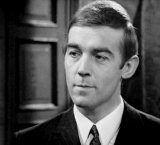
Michael Jayston as "hard to ruffle" Labour MP Gerry Hackett
Curtis has come prepared to go on the offensive, exposing the hypocrisy of his accusers. He finesses Hackett into declaring that a profit of 60% on a public contract is “wildly excessive” and then says he has discovered details of land that had been compulsorily purchased by a Government department. Because the department didn’t need all the land, the remainder was sold to a development company, which then re-sold at a profit of 68%. He says Hackett was on the board of that company. When Hackett replies that he voted against the sale of the property, Curtis counters, “but you didn’t resign!”
Curtis also reveals that Withers’ father learned that he was dying and knew that his firm would have to be sold to pay death duties. He borrowed £200, 000, equal to the book value of the company, using the firm as collateral. He bought several works of art – Matisse, Cezanne etc. When he died, his estate showed a firm worth £200, 000 with a bank debt for the same amount. For tax purposes it showed assets of £200,000 and debts of £200,000. “Death duty nil. Death duty not a penny.” The art was sold by the man’s heirs within a week and the bank was repaid. “And that’s how our noble and honourable chairman today kept his father’s firm.”
Curtis’ revelations are batted off, and as the day progresses his accusations become wilder and more personal. He says that seven years ago he took over the firm Hackett’s father had worked for. “His father died long before that. And when he died, this firm he’d worked for, for over 30 years, the one I later took over – sent a bill for the petty cash he’d had on him when he died. £14 and ten pence.”
Curtis turns to accuse Hackett: “It gave you something to hate. My firm. And my firm’s me. It means nothing to you that I only took the firm over years after your father died.”
Jeremy Longhurst, who played Bruno Heitz in The Gorgon played deputy managing director Sheldon
After a recess, to allow Curtis to calm down, Hackett returns to the detail of the contract. The firm had produced a report showing that modifications to the radar equipment would produce economies of scale. Sheldon (Jeremy Longhurst), the deputy Managing Director, had run the research programme, supervising a pilot run in real conditions. But he says he didn’t give Curtis the results straight away.
Sheldon says Curtis suggested certain other costs should be set against the radar job to make it seem less profitable. Curtis prepared the final accounts with the financial controller but Sheldon carried out the contract because Curtis wasn’t available.
Hackett reveals why: “You were in a nursing home. An alcoholics’ retreat. Drying out.”
A furious Curtis comes across the committee room and grabs Hackett by the lapels. “Did anyone ever give birth to you, Hackett? Or did you claw your way out of the slime clutching a handful of filth to throw? You destroy and never create. You burn people with your envy.” Hackett retorts that, “You’re on your own Curtis. And nobody’s going to answer your call for help.” His wife and daughter have left him. Even his girlfriend has left him. “She was too young for you. You should have tried somebody more your own age.”
Curtis suddenly clutches his chest. From Curtis’ POV we see the circle of onlookers, faces closing in. The sound is a blur of words from the onlookers. Suddenly sound and vision go black. Curtis crashes to the stone floor. Efforts to revive him are futile. Sheldon hands a silk handkerchief to Dawson who places it over Curtis’ face.
Withers tells the shaken Hackett that it’s not his fault, but “Mrs Moate says everything with her eyes. She is blaming Hackett.”
Sheldon says the board of directors will be ready to give back around two million of the firms profit to the Government. For Hackett it’s not the same. “I wanted it out of him. He should have been made to repay it.” Dawson replies: “He kept thousands of people in jobs, Mr Hackett. What have you ever done that’s as useful?”
The final irony comes as Withers tells Hackett that, “Only royalty can die in a royal palace. And this is the Palace of Westminster. He can’t die here.”
“He has done,” Hackett argues.
Withers knows better, “I suppose the Queen’s coroner has been sent for. They’ll meet the ambulance outside the gates and pronounce that he died in the street.”
The final film sequence shows the Houses of Parliament and an ambulance leaving the palace yard. It stops outside the gates and a doctor and coroner get in the back. Hackett’s car is prevented from leaving by the ambulance and he sees Withers’ prediction come true. Finally, the ambulance and car move off in different directions.
Rehearsals for The Curtis Affair began on 6 December 1967, with recording on 2 January 1968 and transmission on 15 January 1968.
The background to Wilfred Greatorex’s script is unknown, other than the fact that it was scheduled to appear in ATV’s Playhouse strand a year after the last episode of The Power Game. Two months later, Patrick Wymark would star in four unconnected plays in the same strand. So while there was no new series of The Power Game, both the lead actor and script editor were being kept in the public eye by ATV.

Michael Jayston and Patrick Wymark in series three of The Power Game
As noted above, the play develops the theme from the penultimate episode of series two of The Power Game, Where Do I Want To Go? (written by Peter Draper, but script edited by Wilfred Greatorex) showing us what might have happened if Bligh or Wilder was called to give evidence. House of Commons select committees usually examine the work of Government departments (it is only relatively recently, with the expansion of contracted-out public services, that private contractors have been examined). Yet, the impression given from the outset is that it is Curtis himself who is under examination.
Greatorex’s script direction for Curtis depicts him as similar in some ways to both Bligh and Wilder – a buccaneer who has built up an empire through his own ability – but also different, out of step with red tape and regulation. However, Curtis does adopt many of the same tactics as Wilder. He begins waspishly by pointing out that if the contract is at fault, it had been agreed by two sides. “I’ve no doubt you’ve got a bucket of whitewash for the civil servant who agreed this contract.”
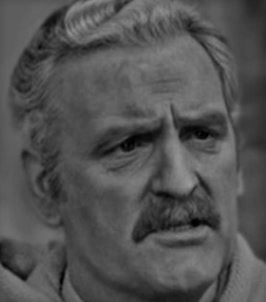
Andrew Keir as Ramsden ("Ranny") Curtis,"lonely and rugged."
Curtis also develops Wilder’s argument from the earlier episode that, “We may have made a million pounds profit, but in this instance as far as public morality is concerned, we failed.” In the play Curtis tells the Chairman Withers (Geoffrey Bayldon) that he feels he’s being treated like a criminal. Withers says, “Nobody is making you out to be a criminal.”
Curtis, “But immoral?”
Withers, “You’re using the word, Mr Curtis, not I.”
Curtis, “But I’ve robbed the Chancellor? I’ve got money that’s rightfully the State’s?”
Withers, “It’s a civilised country, Mr Curtis. It’s up to every man to exercise a sense of right and wrong.”
This leads to Curtis’ revelation of how Withers’ father avoided death duties (the point is brushed aside but Greatorex’s script direction says Hackett, “smells a beautiful scandal”).

Michael Jayston with Barbara Murray in series three of The Power Game
The smoking gun in Greatorex’s play is the report showing that improvements will deliver economies of scale reducing production costs far below those expected by the Government. Again, the argument that this report was unproven revisits Wilder’s explanation for Bligh Construction’s profits on the M23 Construction job. “We spent £70,000 on developing a machine to do the job more effectively. We took a chance that it would work. If it hadn’t, we’d have had to foot the bill. It did work. So the Government has to foot it. So now you’re trying to wriggle out of it.”
If this episode picks up themes from the past, it also looks forward to the third series of The Power Game. The effect used to show Curtis’ climactic heart attack reads like a dry-run for the disturbing sequence during Standard Practice (directed by Robert Tronson) when Caswell Bligh’s heart begins to trouble him. The cynicism which follows Curtis’ death would also be repeated in The Power Game although the sublime black humour and arcane ritual of the fact that commoners are not allowed to die in a royal palace would be hard to beat.
The third series of The Plane Makers had shifted the focus towards Whitehall with the introduction of James Cameron-Grant MP. Although the first two series of The Power Game had increased the scope to include Government departments, the third series would move Bligh and Wilder within Government itself. Directed by David Reid (who would produce the third series) The Curtis Affairmay have been a first draft to see how that would work in practice. Certainly, while none of the characters made it into the third series, Michael Jayston’s performance as the “assured, able, unscrupulous” Hackett ensured that he would join the cast of The Power Game as Lincoln Dowling.
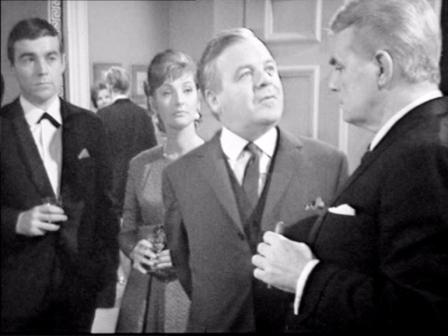
Michael Jayston as Lincoln Dowling in series three of The Power Game
In Called To Account Margaret Hodge’s book about the work of the Public Accounts Committee, she reminds us that, “Members of Parliament prefer to dissect new policy proposals rather than current budgets. The departmental select committees of the House of Commons spend their time exploring the challenges for the future. They rarely use the reports on past and present departmental expenditure produced by the National Audit Office for the basis of an enquiry.” The modern day Curtis is safe.
Many thanks to Victoria Bennett of the British Film Institute Special Collections for her help in viewing Wilfred Greatorex’s rehearsal script for The Curtis Affair.